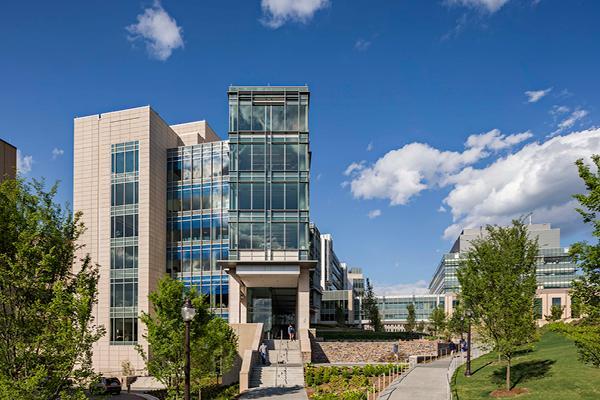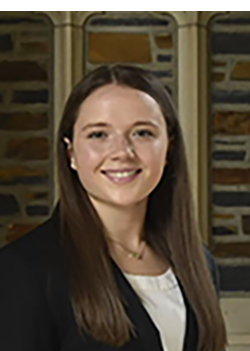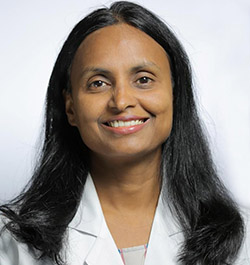
To better prepare second-year Duke medical students for residency — and the real world — the internal medicine component of the School of Medicine’s outPatient Integrated lONgitudinal ExpERience (PIONEER) curriculum integrates early exposure to the outpatient setting — where much of medicine happens — with robust ambulatory training and faculty mentorship.
The 16-week experience aligns medical education theory best practices with the modern realities of clinical care delivery, and fosters high-quality mentoring opportunities for students while opening doors for workforce development and research collaboration with faculty preceptors.
Teaching the Art of Being a Doctor
“I'm teaching them the art of being a doctor, which is transcendent,” said Dr. Jyotsna Mullur, a PIONEER preceptor and assistant professor in the Division of Pulmonary, Allergy, and Critical Care Medicine who volunteered as a preceptor as soon as she joined the faculty, finding an affinity with PIONEER’S skill-development mission.

“Learning exam and differential diagnosis skills gives them a first taste of being the point person for someone's medical care, and that's why a lot of people go into medicine, to be a leader in care,” adds Dr. Mullur, who has built close mentoring relationships with students in her clinic who have stayed in touch for career advice or to just ask questions about allergy and immunology “You get that experience firsthand with PIONEER — the first sense of feeling like a physician.”
Being able to form meaningful connections with patients and attending preceptors in a slower-paced environment that is not often possible in shorter inpatient rotations is rare and highly valuable experience, said Melissa Marchese (MS3 ), who stayed on after her clerkship year as a PIONEER Guide student resource.
“With the help of my preceptors, I went from hesitating to answer patient questions to being comfortable reviewing results and lab values with patients by the end of the rotation,” said Marchese, whose experience in Dr. Matt Labriola’s hematology oncology clinic last year was a turning point in her medical education.
“I had the pleasure of connecting with patients during their chemotherapy journeys and tracking their progress,” she said. “In the clinic, I was exposed to the interpersonal aspects of medicine through incredibly meaningful and sometimes difficult conversations. I listened to their goals of care and lived experiences during treatment, but I also I got to know many patients outside of their illness (what brings them joy, what they are looking forward to).”
Students consistently report that PIONEER is one of their favorite medical school experiences, preceptors said, because it helps them feel like part of the team seeing patients. Through PIONEER, they gain valuable insight into the various roles played by clinical medical team members for a more well-rounded clinical experience that facilitates a better-informed perspective of the internal medicine clinic.
Medicine: A Team Endeavor
For Alexandra Markunas (MS3), PIONEER solidified the fact that medicine is a team endeavor with the patient being at the core of that effort.

“This opportunity really fostered a sense of interdisciplinarity and understanding of the roles of different members of the health care team,” she said. “Overall, the PIONEER program provided an incredibly valuable longitudinal mentor-mentee opportunity, as well as the chance to be a part of multiple interdisciplinary health care teams. Preceptors truly became mentors, and the ability to directly work with other members of the health care team was also a stellar experience.”
One of the most valuable lessons that PIONEER taught Nicole Rivera (MS2), during her experience in Dr. Sangeeta Joshi’s pulmonary clinic, was the importance of adapting to clinical uncertainty while maintaining a patient-centered approach.
“Real patient cases often do not follow textbook patterns, and developing the ability to think critically through ambiguity has strengthened my clinical reasoning,” she said. “Listening carefully to a patient's story frequently uncovers key details that shape diagnosis and management. Learning to ask thoughtful questions, reason through complexity, and take the necessary time — even in busy clinic settings — has been formative for both my clinical skills and professional growth.”
The Education Mission
Launched in August 2023, the PIONEER program at Duke has been heralded as a welcome addition to the curriculum to improve the student experience, providing a solid framework for how to continue in medical training as learners build on experience, grow into leaders, and go from MS2s to sub-interns, residents, senior residents and then fellows.

Faculty preceptors span a wide variety of clinical areas from general medicine to subspecialties and from the main Duke campus to outlying areas. While students work in diverse clinics across different specialties, the skills they are building translate across the field of internal medicine through a deeper exposure to previously encountered subspecialties, which sometimes prompts changes in career plans.
"We have so many outstanding educators in the Department of Medicine," said Dr. Poonam Sharma, director of PIONEER and associate professor in the Division of General Internal Medicine. "There are too many outstanding preceptors to name them all but they span a wide variety of clinical areas from general medicine to a variety of subspecialities and from our main Duke campus to outlying areas. Dr. Gwen Buhr, in her educational leadership role for the Department, has done a fantastic job coordinating this and also works with students directly and so is another great resource for faculty who are interested in getting involved."
Senior faculty member and PIONEER Preceptor Professor Sangeeta Joshi, MD, was part of the patient-first curriculum development committee at the School of Medicine that implemented PIONEER.
“I am most grateful for the opportunity to help shape the future of health care one student at a time,” she said. “It’s very satisfying to be part of a school of medicine as it allows me to provide direct, patient care, and develop a health care workforce that can be equally passionate.”